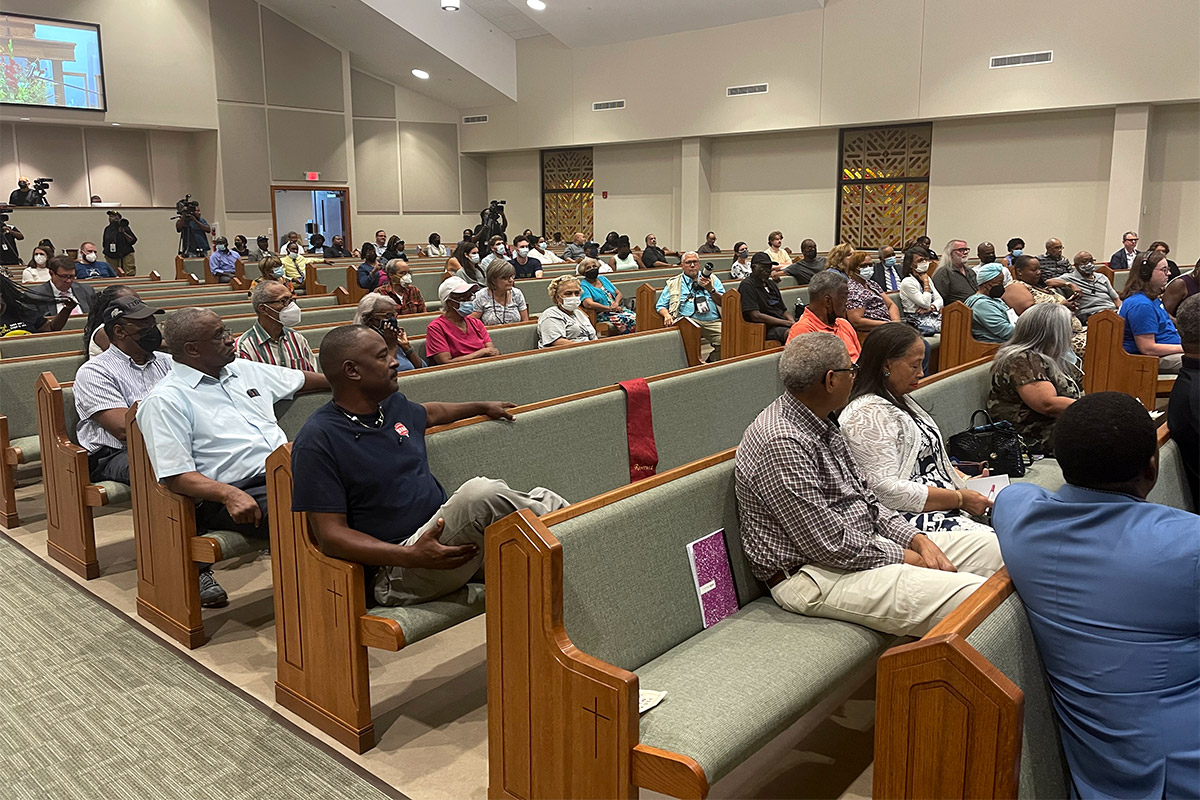JACKSON, Miss.—Mayor Chokwe A. Lumumba shared tables outlining needs at the capital city’s water-treatment plants, totalling $35.6 million at a town hall in College Hill Missionary Baptist Church last night. The city has been under a boil-water notice for more than six weeks due to turbidity issues at the O.B. Curtis Water Treatment plant, then followed by a city-wide drop in water pressure due to flooding of the Pearl River that created treatment challenges at the facility it feeds.
Lumumba said the problems affecting the water-treatment plants in the city are decades in the making. “I remember in 1989, a big freeze that came over the city at that time and debilitated our water system,” he told the people gathered at the church. “I remember being without water for some time.”
“Some of you I’ve heard talk further back than that, and so this is something that unfortunately has become a way of life in Jackson, and one that we should not continue to be comfortable with or to continue to just say that that’s what it is to live in Jackson.”
Based on the undated charts the mayor shared at the event, the administration showed that the O. B. Curtis Water Treatment Plant requires more than $20 million to fix priority needs. The significant expenses are structural crack repair and lining of conventional sedimentary basins ($3 million), a plant generator ($7 million) and lime-sludge removal ($ 2 million). The administration is saying that the other water-treatment facility in the city—J.H. Fewell—needs $15 million, with filter repairs requiring $3.5 million, lime-sludge removal $2 million and a plant generator for $3 million.

Since President Joe Biden approved an emergency declaration for the water-treatment facility on Aug. 30, 2022, the Federal Emergency Management Agency will now fund needed urgent repairs and deploy human resources to the facility for 90 days. On Sept. 12, Gov. Tate Reeves asked the Small Business Administration to provide relief for businesses affected by the ongoing water crisis in the city after the mayor sent him a letter on Sept. 5, 2022.
The City welcomed the governor’s action in a Sept. 13, 2022, press release. “We are well aware of the economic hardship the water crisis and lengthy boiled water notice has caused our businesses—restaurants in particular, and we remain committed to pursuing all possible avenues to alleviate that hardship,” the release stated. “We appreciate the Governor’s request to the SBA to implement a Small Business Administrative Declaration for Hinds County.”
“Any relief in the form of a SBA Economic Injury Disaster loan would provide these businesses and non-profits the means to recover from financial instability related to the water crisis, which we requested on Sept. 5.”
Mayor Considers New Water Treatment Facility
At Tuesday’s town-hall meeting, the mayor said he is considering whether the best option is to build a new water-treatment facility.
“But another question that we ask is, is it worth it to repair this water-treatment facility, or do we need to be going for a new water-treatment facility completely?” he said. “A part of that assessment is not only what isn’t working; it’s also whether the functionality of the water treatment facility makes sense.”
In August, U.S. Sen. Roger Wicker, R-Miss., said a new water plant on the Pearl River could help with the Jackson water crisis. The proposal is part of the controversial ‘One Lake’ development and flood-control mitigation plan.
Lumumba explained the challenge of having a hybrid water-treatment process at the O.B. Curtis Water Treatment facility, saying it requires a more intense treatment process because it is a surface water system taking in raw water from the Pearl River. He explained that Mississippi has only two surface water-treatment facilities with the other in Tupelo.
“It also means that it makes it incredibly challenging to staff the professionals that know both treatment processes (conventional and membrane),” the mayor added. “So when we’re bringing people from other states, or looking for them here in this state, many of them have conventional expertise or membrane expertise, and Jackson, our technicians and our professionals have had to be trained in both.”
The Mississippi Free Press previously reported that the Environmental Protection Agency had criticized the City of Jackson for not working harder to hire qualified water operators for the O.B. Curtis treatment facility.

“It also means that it makes it incredibly challenging to staff the professionals that know both treatment processes,” Lumumba added. “And so part of our challenge has been, how do we deal with the fact that a lot of the institutional knowledge has walked out of the door?”
“How do we make certain that it is staffed and understand that what it takes in order to staff those professionals is time.”
The mayor said the staffing challenges necessitate a new way of running the system and that the administration is leaning toward effectuating “a third party and operations maintenance agreement.”
City Council, County, State Pledges Water Funds
City of Jackson Chief Financial Officer Fidelis Malembeka Jr. said at the Tuesday town hall that the city council had earlier that day approved funding for the 2023 fiscal year. That included money to address the water and sewer needs of the city, including about $30.8 million to address sewer challenges and $30 million for water infrastructure.
“The council did earlier adopt a plan to spend approximately $34 million of our $42 million from (American Rescue Plan Act funds) that we received towards water and sewer infrastructure,” he added. “The State has mentioned that they’ll be matching dollar for dollar in what we put into our sewer and water infrastructure.”

The Hinds County Board of Supervisors had equally committed $17 million for Jackson’s water infrastructure, Malembeka said. “And the State will be matching those funds,” he added.
The mayor said that the city is implementing a new water metering and billing system to close “the gap between water utility costs and water utility revenue,” with March 2023 as the estimated conclusion date.
“We have already been able to estimate that we’ll conclude this fiscal year with greater revenue than the year before,” Lumumba said. “So we’re seeing the increases, we’re seeing the growth, we’re seeing that they’re being able to capture more money in the system.”
The City of Jackson said in a Sept. 14, 2022, statement that it is receiving “isolated reports of discolored water and pressure issues.”
“These reports are decreasing each day,” it added. “Many of these issues are related to routine water leaks or meter issues. Each is being assessed for response. If you are experiencing discolored water or no pressure, please report using this tool https://arcg.is/0LDmjb.”
“This will allow us to track any remaining issues and address them. We are currently monitoring this information to respond as needed.”
The report added that teams of operators, mechanics, and instrument technicians from Emergency Management Assistance Compact, Mississippi Rural Water Association and some from South Carolina, Michigan, Maryland and Ohio are on the ground. “This work will expand to the J.H. Fewell Water Plant today,” it added.
“Investigative sampling continues in expanded capacity today to monitor water quality. Hydrant flushing is occurring in certain areas. This is intentional and may cause some lower pressure in the immediate area of flushing. We will continue to evaluate when full sampling can begin. This is contingent upon sustained pressure. We will need two rounds of clear samples to be able to remove the boil water notice.”










